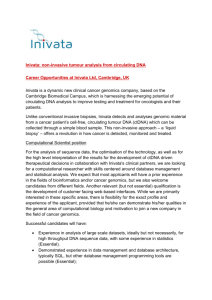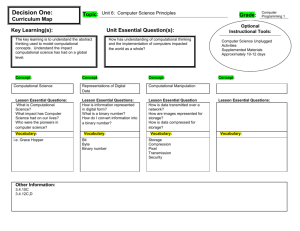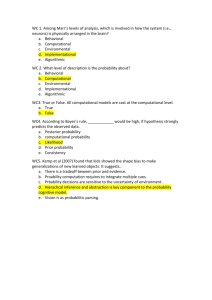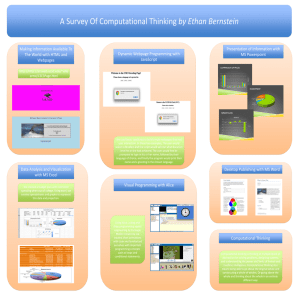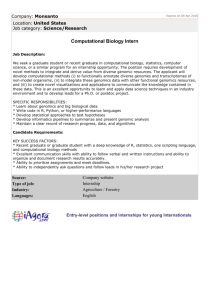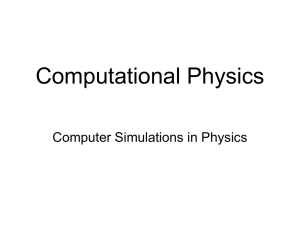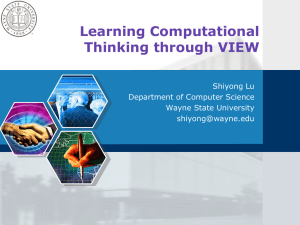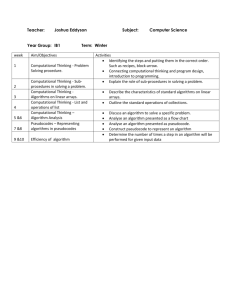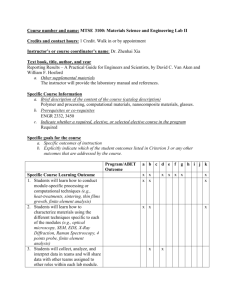Job Title: - Jobs - University of Nottingham
advertisement
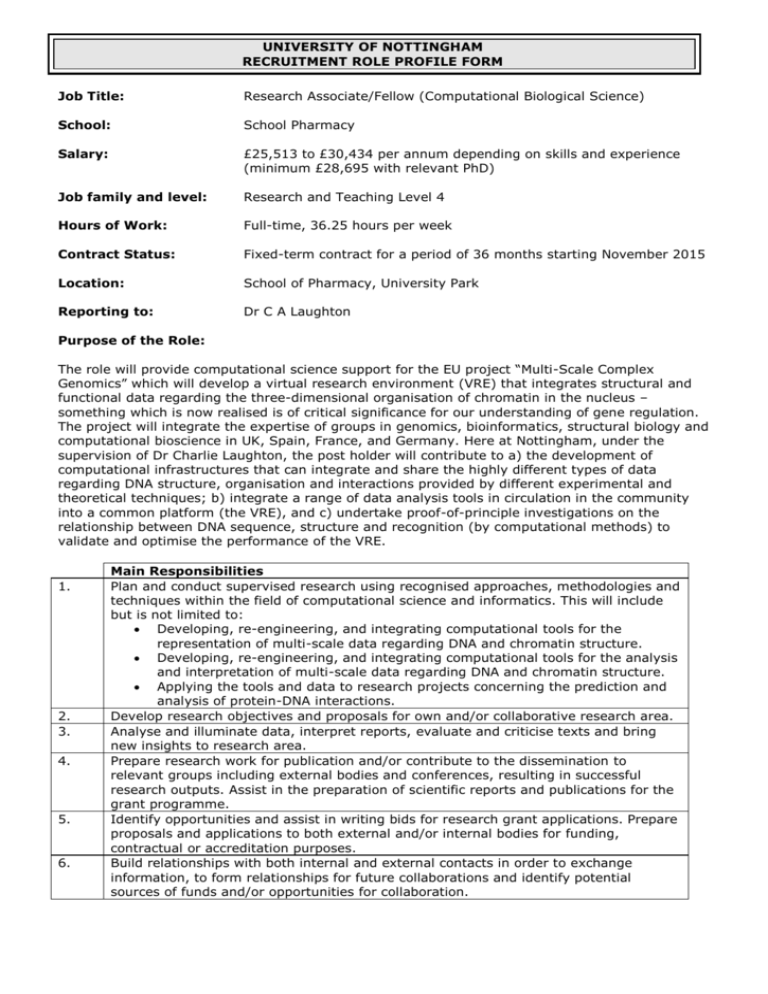
UNIVERSITY OF NOTTINGHAM RECRUITMENT ROLE PROFILE FORM Job Title: Research Associate/Fellow (Computational Biological Science) School: School Pharmacy Salary: £25,513 to £30,434 per annum depending on skills and experience (minimum £28,695 with relevant PhD) Job family and level: Research and Teaching Level 4 Hours of Work: Full-time, 36.25 hours per week Contract Status: Fixed-term contract for a period of 36 months starting November 2015 Location: School of Pharmacy, University Park Reporting to: Dr C A Laughton Purpose of the Role: The role will provide computational science support for the EU project “Multi-Scale Complex Genomics” which will develop a virtual research environment (VRE) that integrates structural and functional data regarding the three-dimensional organisation of chromatin in the nucleus – something which is now realised is of critical significance for our understanding of gene regulation. The project will integrate the expertise of groups in genomics, bioinformatics, structural biology and computational bioscience in UK, Spain, France, and Germany. Here at Nottingham, under the supervision of Dr Charlie Laughton, the post holder will contribute to a) the development of computational infrastructures that can integrate and share the highly different types of data regarding DNA structure, organisation and interactions provided by different experimental and theoretical techniques; b) integrate a range of data analysis tools in circulation in the community into a common platform (the VRE), and c) undertake proof-of-principle investigations on the relationship between DNA sequence, structure and recognition (by computational methods) to validate and optimise the performance of the VRE. 1. 2. 3. 4. 5. 6. Main Responsibilities Plan and conduct supervised research using recognised approaches, methodologies and techniques within the field of computational science and informatics. This will include but is not limited to: Developing, re-engineering, and integrating computational tools for the representation of multi-scale data regarding DNA and chromatin structure. Developing, re-engineering, and integrating computational tools for the analysis and interpretation of multi-scale data regarding DNA and chromatin structure. Applying the tools and data to research projects concerning the prediction and analysis of protein-DNA interactions. Develop research objectives and proposals for own and/or collaborative research area. Analyse and illuminate data, interpret reports, evaluate and criticise texts and bring new insights to research area. Prepare research work for publication and/or contribute to the dissemination to relevant groups including external bodies and conferences, resulting in successful research outputs. Assist in the preparation of scientific reports and publications for the grant programme. Identify opportunities and assist in writing bids for research grant applications. Prepare proposals and applications to both external and/or internal bodies for funding, contractual or accreditation purposes. Build relationships with both internal and external contacts in order to exchange information, to form relationships for future collaborations and identify potential sources of funds and/or opportunities for collaboration. 7. 8. 9. 10. 11. 12. 13. Co-ordinate the operational aspect of research networks, for example, arranging meetings and updating web sites etc. and contribute to collaborative decision making with colleagues in area of research. Work in conjunction with others in the research team to achieve objectives and make an active contribution to the success of the team. Provide support, guidance and supervision to other staff, where appropriate in own area of expertise. Assist in the supervision of undergraduate and/or postgraduate students projects, fieldwork and placements, as appropriate. To participate in the assessment of student knowledge and co-supervise projects at Masters level. Collaborate with academic colleagues on areas of shared interest for example, course development, collaborative or joint research projects. Plan and manage own research activity and resolve problems, if required, in meeting own/team research objectives and deadlines in collaboration with others. Contribute to the organisation of research resources and facilities, laboratories and workshops as appropriate. Undertake general laboratory duties such as ordering of reagents, equipment maintenance, and laboratory housekeeping. Contribute to teaching, for example through laboratory demonstrations, lectures to postgraduate workshops and/or delivery of Level 1 modules. Person Specification: Qualifications/ Education Skills/Training Essential 1. A 1st or upper-second class honours degree in a Physical or Computational Science and a PhD thesis submitted or awarded in an area related to Bioinformatics or Structural Biology. 2. Expertise in the computational analysis of DNA and/or chromatin structure. 3. Fluency in at least one out of Fortran or C/C++, and one out of Python, Java, R, or Perl. 4. A strong commitment to interdisciplinary research, in particular between genomics and structural biology. 5. Excellent oral and written communication skills including the ability to communicate complex information with clarity and write to a publishable standard. 6. Ability to creatively apply relevant research methods and devise and manage research programmes. 7. Excellent problem solving, IT and organisational skills including the effective deployment of resources. 8. Ability to build effective relationships as part of a team and collaborate with others, both internally and externally. Desirable A PhD in an area related to DNA and/or chromatin structure and organisation. Fluency in as many as possible out of: Fortran, C/C++, Python, Java, R, and Perl. Expertise in modern practices in software development including version control, validation and testing, and documentation. 9. Flexible, proactive and dedicated approach. 10. Ability to travel within the UK and overseas. Experience Experience in software development. Presenting work effectively to a variety of professional and academic audiences at meetings and conferences. Significant experience in research projects concerned with the computational analysis of DNA and/or chromatin structure. Experience of developing new approaches, models, techniques or methods in the analysis of DNA or chromatin structure. Experience in software development as part of a team. First author publications in high impact factor journals. Previous success in gaining support for externally funded research projects. Training and/or supervision of staff or students. A consistent track record of published research in peer-reviewed journals and writing high quality reports and papers for publication. Statutory/legal Due to the requirements of the UK Border and Immigration Agency, applicants who are not UK or EEA nationals and whose immigration status entitles them to work without restriction in the UK will be considered on an equal basis with UK and EEA nationals. Other non-UK or non-EEA nationals whose employment will require permission to work subject to a resident labour market test may only be considered if there are no suitable UK or EEA national candidates for the post. Please visit http://www.ukba.homeoffice.gov.uk/ for more information. Informal enquiries may be addressed to Dr Charles Laughton [Charles.laughton@nottingham.ac.uk], tel 0115 9513405). Please note that applications sent directly to these email addresses will not be accepted. Equality and Diversity The University of Nottingham has a range of policies to promote equality and diversity in the workplace which are fully supported and promoted by the School through its Equality and Diversity Committee. The School welcomes applications from all candidates and you can read more about our commitment to equality and diversity at http://tiny.cc/UoNPharmEandD
